Introduction
In a world where uncertainty is the only constant, the ability to effectively manage crises has become a critical priority for organizations across all sectors. Crisis management consulting offers a lifeline, equipping businesses with the strategies and insights needed to not only survive but thrive in the face of adversity. From navigating public relations disasters to addressing financial turmoil, these specialized advisory services provide a structured approach to tackling unforeseen challenges head-on.
By implementing tailored crisis management plans that encompass risk assessments, communication strategies, and recovery protocols, organizations can stabilize operations and safeguard their reputations. This article delves into the multifaceted realm of crisis management consulting, exploring its importance, key strategies, real-world applications, and future trends that will shape the landscape of organizational resilience.
Defining Crisis Management Consulting: An Overview
Crisis management consulting encompasses specialized advisory services aimed at organizations grappling with significant challenges that jeopardize their operational stability or reputation. This consulting type includes comprehensive strategies designed to prepare for, respond to, and recover from crises, ensuring that organizations can effectively navigate turbulent times.
Our team offers hands-on executive leadership through interim management, swiftly identifying underlying organizational issues and initiating transformational change via our proven Rapid-30 process, which emphasizes rapid assessment and implementation of solutions to drive measurable results.
We also offer bankruptcy case management services to assist businesses in navigating financial distress while minimizing disruption. By collaborating with your stakeholders, we develop tailored crisis management plans that include:
- Risk assessment
- Communication strategies
- Recovery protocols
This decisive action is vital for stabilizing financial positions and enhancing operations, enabling entities to respond swiftly and effectively to minimize potential damage while facilitating a return to normal operations.
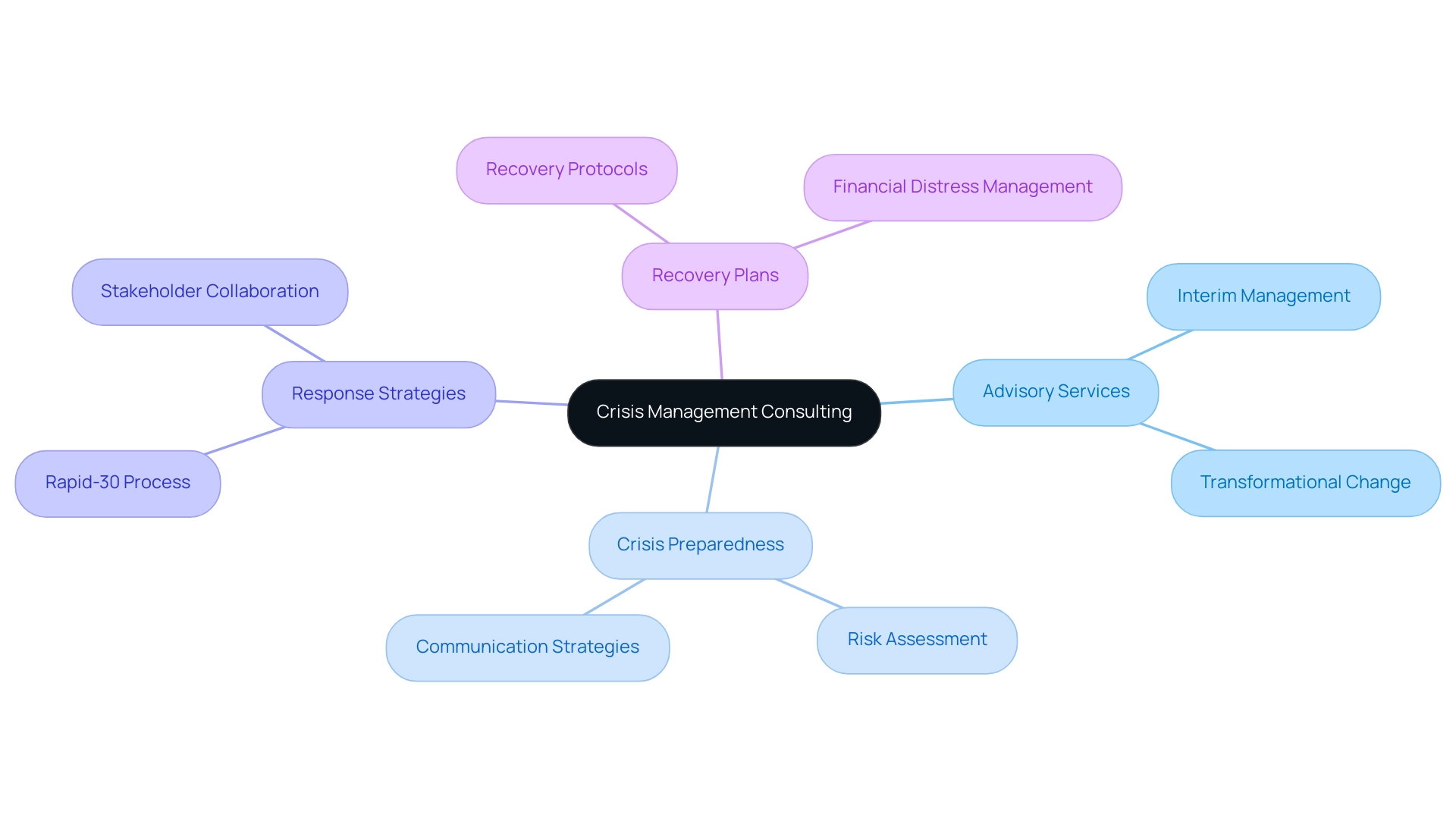
The Importance and Applications of Crisis Management Consulting
Crisis management consulting is essential for entities as it provides structured approaches to managing unforeseen challenges. The applications of this consulting service are extensive and can encompass everything from managing public relations emergencies to navigating financial distress.
For instance, during a public relations emergency, a consultant may assist a company in creating a communication plan that tackles stakeholder issues and reduces reputational harm. In the case of financial difficulties, consultants conduct assessments to identify areas for cost reduction and operational efficiency.
Utilizing real-time analytics through a client dashboard, they continuously monitor the effectiveness of implemented plans, allowing for quick decision-making that preserves business health through a 'Decide & Execute' approach. This proactive approach not only assists organizations in handling urgent challenges but also provides them with the tools and methods to test hypotheses and implement lessons learned, ensuring long-term resilience and sustainability.
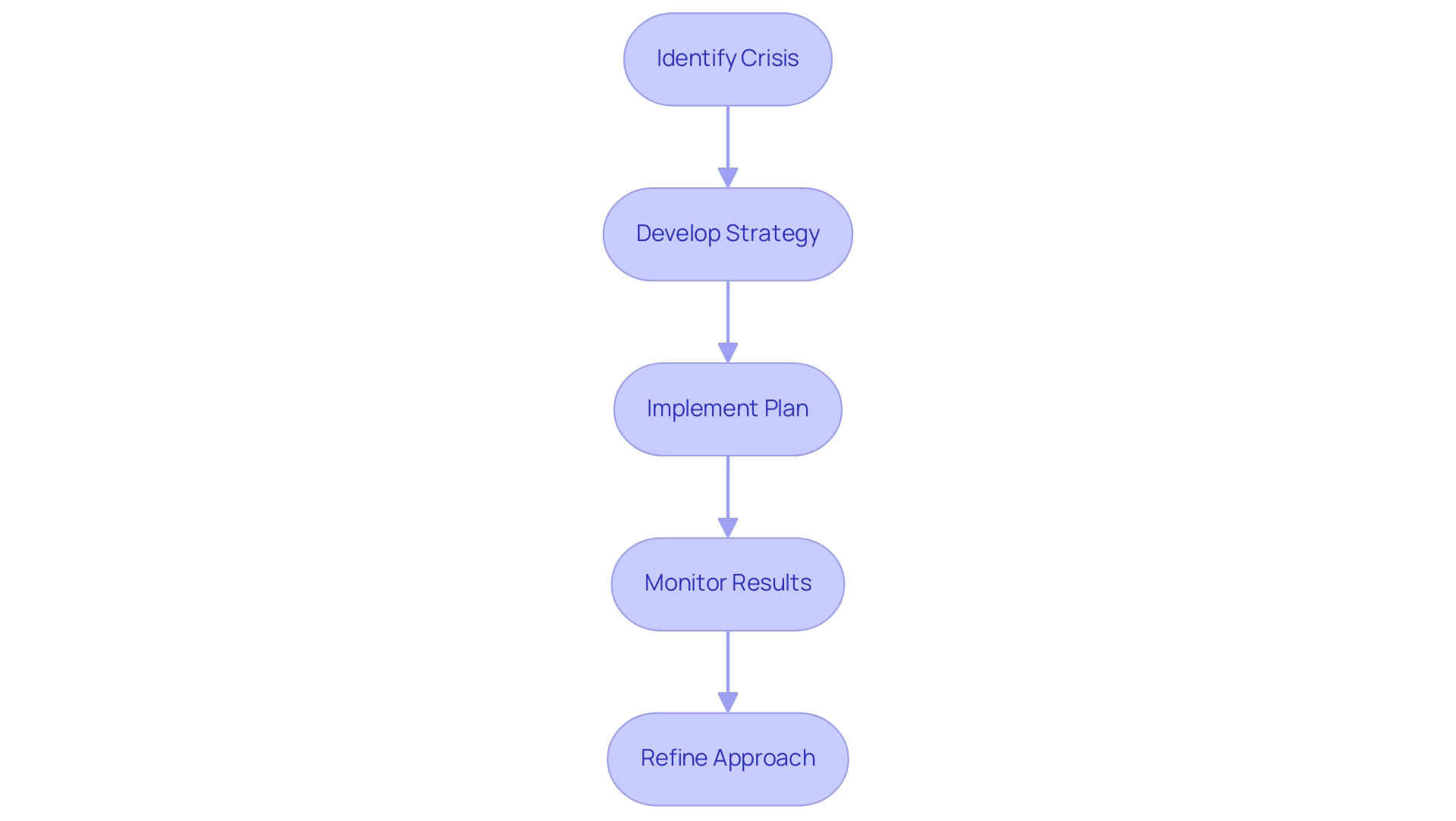
Key Strategies in Crisis Management Consulting
Key strategies in crisis management consulting include:
- Risk assessment
- Effective communication
- Stakeholder engagement
All enhanced by a structured client engagement process. Our comprehensive business review is crucial as it aligns key stakeholders and provides a deeper understanding of the business situation beyond just the numbers. This process allows us to identify potential threats and vulnerabilities within a company, enabling the development of tailored response plans.
Effective communication is crucial during a crisis; consultants collaborate with entities to craft clear, transparent messaging that keeps stakeholders informed and reassured. By supporting a shortened decision-making cycle throughout the turnaround process, we facilitate decisive actions that preserve the organization.
Furthermore, involving stakeholders—such as employees, customers, and investors—ensures alignment and promotes contributions to the entity’s recovery efforts. We are committed to operationalizing the lessons learned from this process, which is essential for building strong, lasting relationships with our clients.
We continually monitor the success of our plans through a client dashboard that offers real-time business analytics, allowing for ongoing diagnosis of business health. By utilizing these approaches, consultants assist organizations not only in handling emergencies but also in enhancing their overall emergency readiness while cultivating lasting collaborations.
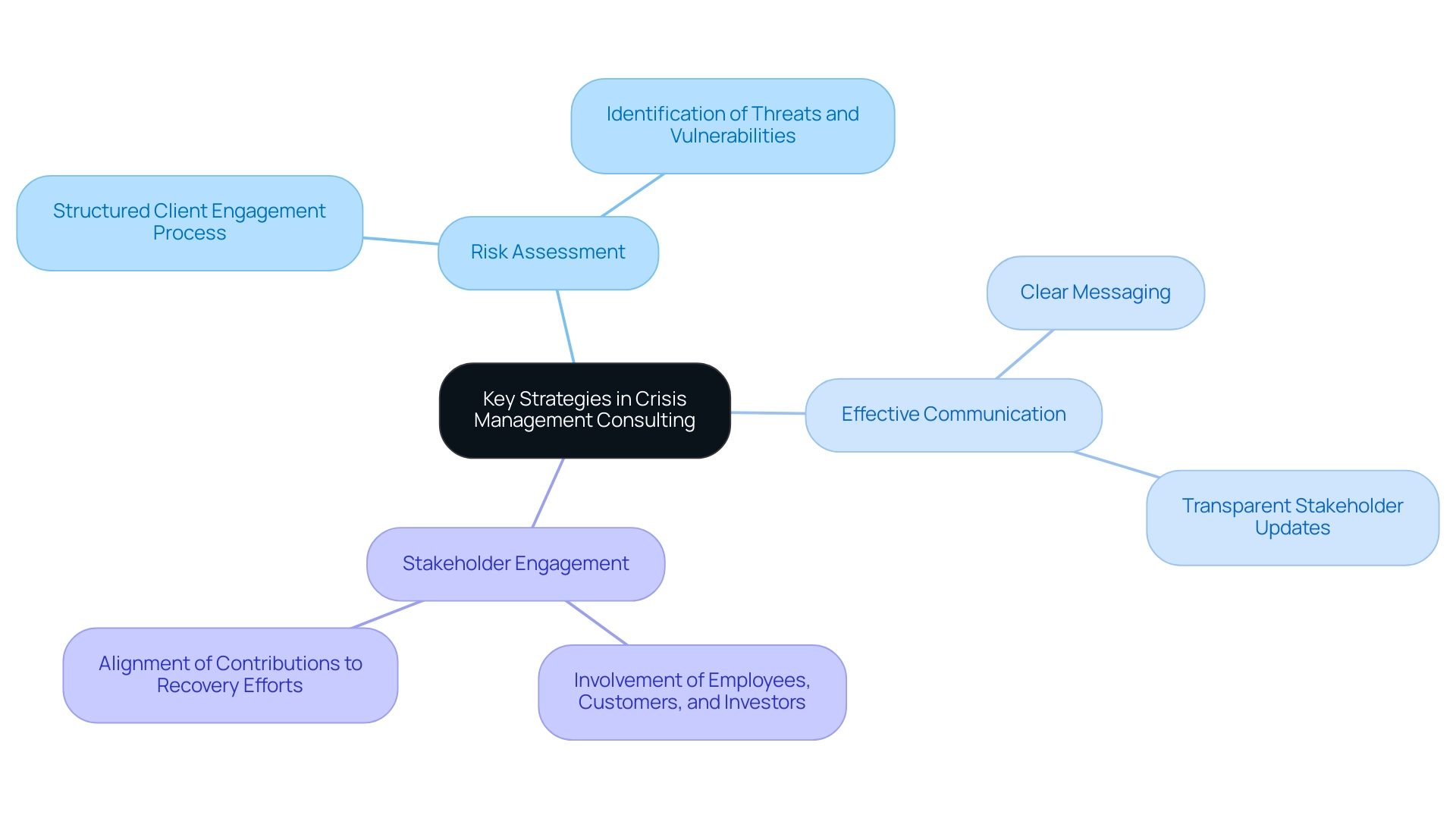
Real-World Examples of Crisis Management Consulting
One notable example of effective emergency management is the response to the 2010 BP oil spill, where consultants collaborated with BP to develop a comprehensive communication strategy that not only addressed public concerns but also managed stakeholder perceptions through real-time analytics.
Another significant case involved the financial restructuring of a major retail chain facing bankruptcy. Here, consultants conducted thorough assessments, testing hypotheses and identifying cost-cutting measures that streamlined decision-making processes and operational efficiencies, ultimately leading to a successful turnaround.
These examples demonstrate how emergency management consulting can provide critical support during challenging times, utilizing data-driven insights and a commitment to operationalizing lessons learned.
Our approach involves utilizing a client dashboard that offers real-time business analytics, allowing entities to continually monitor their business health and make informed decisions, thus emerging stronger and more resilient.
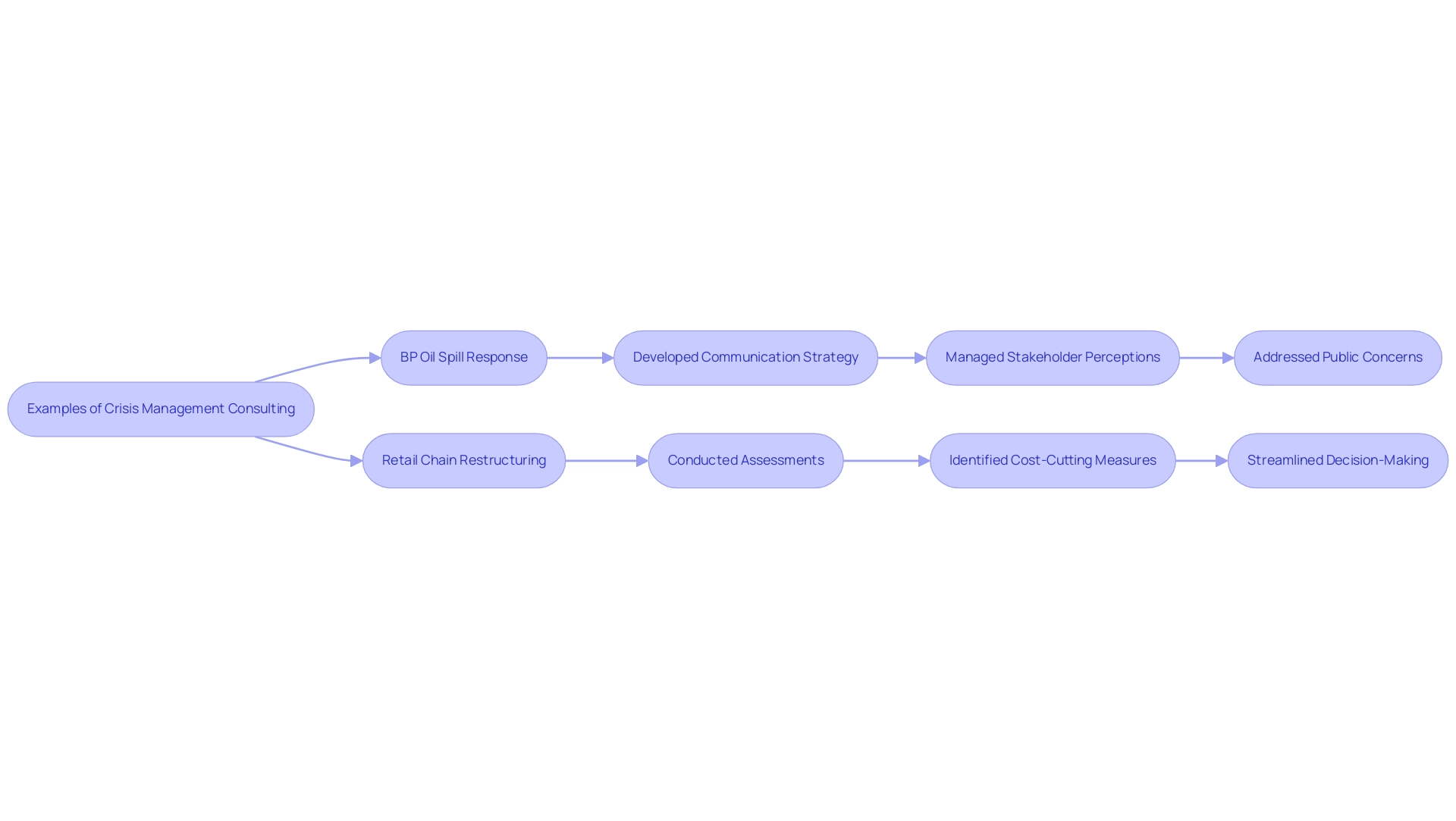
Future Trends in Crisis Management Consulting
The future of emergency management consulting is likely to be shaped by advancements in technology, increased focus on sustainability, and the growing importance of data analytics. As entities encounter new forms of crises—such as cybersecurity threats and climate-related challenges—consultants will need to adjust their approaches accordingly.
The incorporation of technology, such as AI-driven analytics, will improve the capacity to predict, evaluate, and react to emergencies in real-time. Furthermore, an emphasis on sustainability will encourage entities to consider the long-term impacts of their crisis management strategies, ensuring that they not only recover but also contribute positively to society.
By staying informed about these trends, organizations can better prepare for the future challenges they may face.
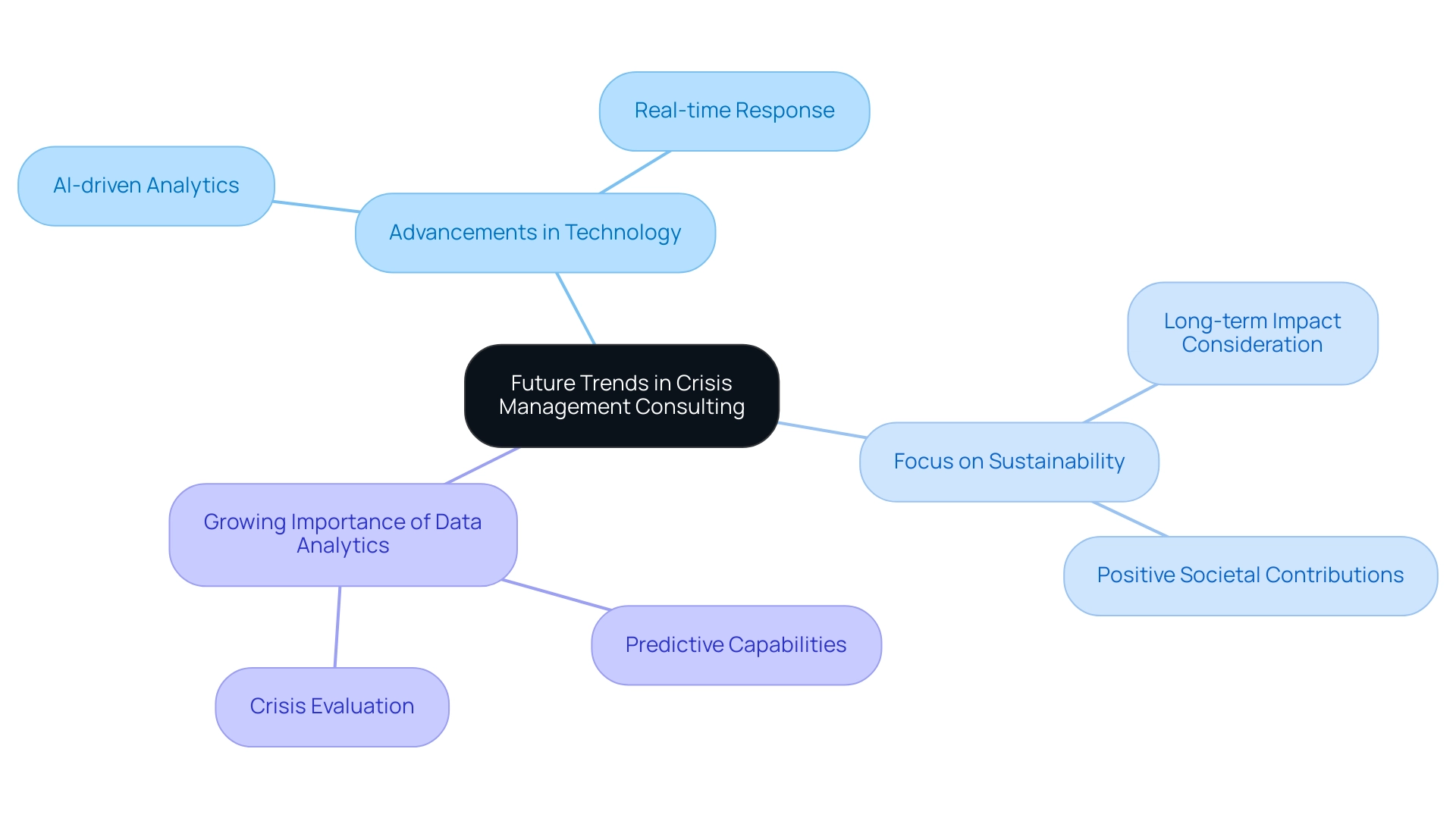
Conclusion
Crisis management consulting serves as a critical resource for organizations navigating the unpredictable landscape of modern business challenges. By providing tailored strategies, from risk assessments to communication protocols, consultants empower businesses to stabilize operations and safeguard their reputations during turbulent times. The importance of proactive crisis management cannot be overstated; it equips organizations with the tools to not only respond effectively to immediate crises but also to foster long-term resilience.
Real-world applications of crisis management consulting highlight its versatility and effectiveness. Successful case studies, such as the response to the BP oil spill and the financial restructuring of a major retail chain, demonstrate how strategic insights and data-driven approaches can lead to recovery and growth. These examples reinforce the value of engaging stakeholders and maintaining transparent communication throughout the crisis management process, ensuring that all parties are aligned and informed.
Looking ahead, organizations must remain vigilant and adaptable as the landscape of crisis management continues to evolve. Embracing advancements in technology, prioritizing sustainability, and leveraging data analytics will be essential in navigating future challenges. By investing in crisis management consulting today, organizations can not only mitigate risks but also emerge stronger and more prepared for whatever lies ahead.
Taking decisive action now will pave the way for a resilient future, ensuring that organizations can thrive in the face of adversity.




